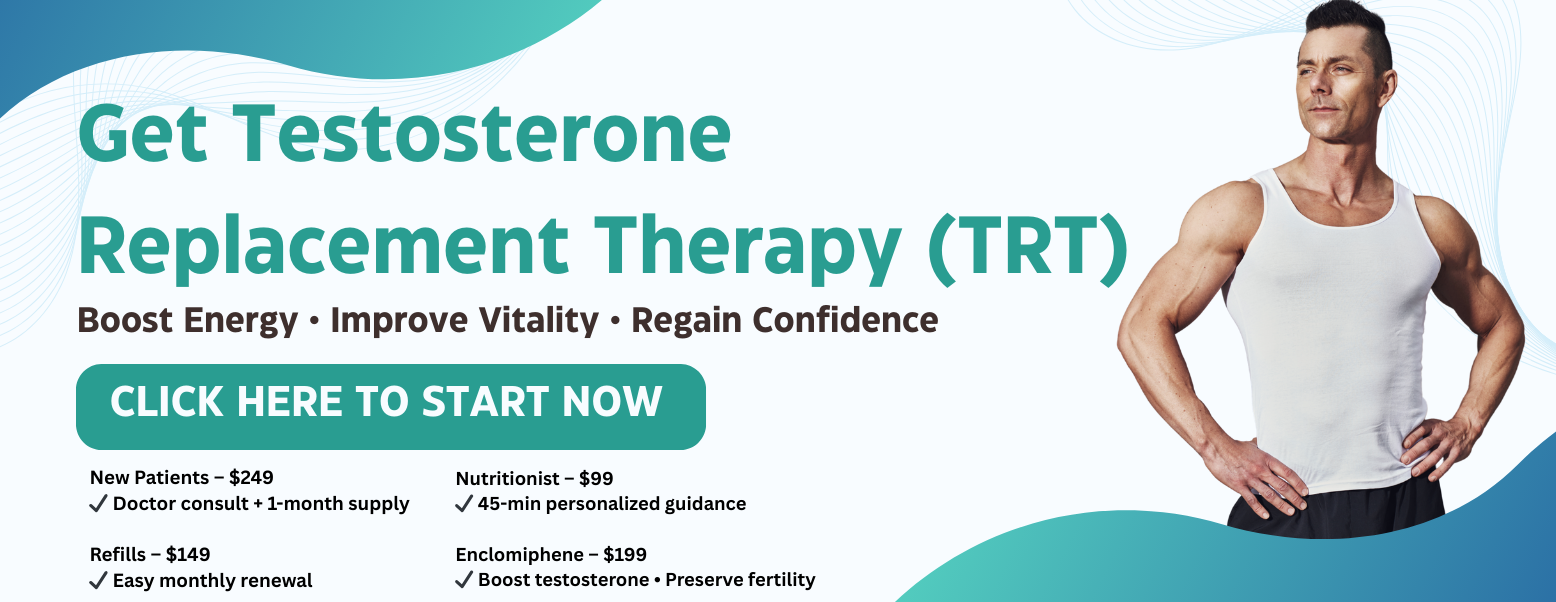The Human body is not just about blood and bones, it is an entire team of skilled workers working every second, day and night. Hormones are the messages these workers send to one another. But what happens when one message doesn't get delivered like it should have been? That’s when things start to go off track.
Hormones regulate your overall being, such as mood, energy levels, healthy hair and nails and many other things, but sometimes such basic things also go off track and it starts interfering with daily activities, that is when hormone fixing is required and many people take necessary actions such as clinical or natural help.
Don’t Wait, Reclaim Your Vitality – Click here to Book Your TRT Consultation Now!
Many men turn to Testosterone Replacement Therapy (TRT), hoping to fix fatigue, low energy, and lost libido. And while TRT can bring relief, some men find that their problems don’t fully go away. The reason might not be like a faulty therapy or body not respondinging fully to the treatment, but another hormone, which is thyroid or simply an underactive or overactive thyroid.
The thyroid and testosterone are one of the most important hormones and are closely interwoven. Even after taking TRT, if you’re still tired, gaining weight, or feeling foggy despite testosterone replacement therapy (TRT), your thyroid may be quietly interfering. Understanding this connection is the key to truly feeling like yourself again.
Let’s explore how these two hormonal systems work together and how to manage both for better results.
About Hypothyroidism in Men
The thyroid is a very small gland located in your neck, but it plays a very crucial role in how your body functions. It controls various aspects such as how fast your body burns energy, how warm or cold you feel, how clear your mind is, and even how steady your mood stays.
Hypothyroidism happens when the thyroid slows down and doesn’t produce enough hormones, mainly T3 and T4. These hormones help run everything from your metabolism to your energy levels. Though often overlooked in men, hypothyroidism can have a major impact on how you in your routine life.
For many men, it hides in plain sight, showing up as fatigue, weight gain, or low motivation that’s hard to explain.
Symptoms of Hypothyroidism in Men
When your thyroid slows down, your body slows down with it. You might notice:
- You’re constantly tired, no matter how much you rest
- Your weight creeps up, even with good eating and exercise
- Your interest in sex drops, and performance becomes an issue
- Your mood shifts—sometimes feeling down or irritable for no clear reason
- Your memory feels foggy or scattered
- You feel cold when others don’t
These signs might seem like random annoyances, but together, they paint a clear picture of thyroid trouble.
Common Causes of Hypothyroidism
Why does the thyroid stop working properly? There are several common reasons:
- Autoimmune diseases, like Hashimoto’s, where the body attacks its own thyroid
- A lack of iodine, which is essential for thyroid hormone production
- Certain medications or past radiation treatment
- Pituitary gland issues that affect hormone signalling
- Family history or genetic factors
No matter the cause, catching it early can make all the difference in how you feel.
Diagnosis of Hypothyroidism
If you suspect your thyroid isn’t pulling its weight, a few simple blood tests can provide answers. Your doctor will usually check:
- TSH (Thyroid Stimulating Hormone), which tells how hard your body is trying to wake up the thyroid gland
- Free T4 and Free T3, the active thyroid hormones
- Thyroid antibodies, to see if an autoimmune issue is at play
These tests offer a window into how well your thyroid is functioning—and whether it’s holding back your progress.
Can TRT Influence Thyroid Health?
This is a common question: If you start TRT, will it help your thyroid or hurt it?
The truth is, testosterone and thyroid hormones work in tandem. When one is off, the other often struggles too. Here’s how they affect one another:
1. Testosterone Affects Thyroid Conversion
Testosterone helps convert T4 (inactive thyroid hormone) into T3 (the active form). If testosterone is low, this conversion slows down. TRT can help restore that balance and improve energy and metabolism.
2. TRT May Mask Thyroid Symptoms
When men start TRT, they often feel better, but not for long. If thyroid issues are in the background, they may cause the same symptoms to creep back in. That’s why it’s important to check both hormones.
3. TRT and Autoimmunity
Some early studies show that testosterone may reduce inflammation, which might benefit autoimmune thyroid conditions. It’s a promising idea, but still needs more research.
4. The Estrogen-Testosterone-Thyroid Connection
Testosterone converts into estrogen, but when this happens in excess, it raises levels of something called thyroid-binding globulin (TBG), which can trap thyroid hormones and make them less available to your body.
How Hypothyroidism Affects TRT Outcomes
If your thyroid isn’t working well, TRT alone might not give you the results you expect. That’s because your body needs both systems to be in sync.
1. Sluggish Metabolism Reduces TRT Benefits
A slow thyroid drags down your metabolism. Even with TRT, you might still struggle to lose weight or gain muscle. Your workouts may not feel as effective.
2. Poor Thyroid Health Dampens Libido and Mood
You might have a good testosterone level, but still feel low. An underactive thyroid can bring back issues like low libido, mood swings, or erectile dysfunction.
3. Thyroid Dysfunction Alters Hormone Absorption
Your body’s ability to process and use testosterone changes and also varies if thyroid hormones are low. You might need to adjust your TRT dose or try a different form, like switching from gel to injections.
4. Fatigue and Brain Fog Persist Despite TRT
TRT isn’t a fix-all. If you’re still tired, foggy, or forgetful, the real issue might be your thyroid. Treating both conditions can bring real clarity and renewed energy.
How to Manage Both Conditions Together?
It’s possible to manage low testosterone and thyroid issues at the same time. It just takes a thoughtful approach.
1. Get Comprehensive Hormonal Testing
Don’t rely on guesswork. Before adjusting your TRT, make sure to get full thyroid testing, including:
- TSH, Free T3, Free T4
- Reverse T3
- Thyroid antibodies
- Cortisol and vitamin D (which support hormone balance)
This will help your provider fine-tune your treatment plan.
2. Address Nutrient Deficiencies
Your hormones rely on certain nutrients to do their jobs well:
- Zinc helps with testosterone production
- Selenium and iodine support thyroid hormone creation
- Magnesium and vitamin D help your cells respond to hormones
You may benefit from a daily multivitamin or targeted supplements.
3. Monitor Symptoms, Not Just Lab Values
Numbers don’t tell the whole story. A good doctor listens to how you feel, not just what your bloodwork says.
4. Prioritise Gut Health
Your gut is more than just your digestion; it’s also where much of your T4 turns into active T3. Eating more fibre, adding probiotics, and cutting back on inflammatory foods can support both thyroid and testosterone health.
5. Choose the Right TRT Protocol
For men with thyroid issues, weekly testosterone injections often work better than daily doses. They provide more stable hormone levels, which your body can manage more easily.
6. Stay Consistent with Treatment
Neither TRT nor thyroid treatment works overnight. Stick with your plan for at least 3–6 months before judging your results. Regular follow-ups with your provider will help keep everything on track.
How to Choose the Right Clinic for Dual Hormonal Treatment?
When managing both thyroid and testosterone issues, you want a provider who understands how these systems interact. This isn’t a job for general care.
Here’s what to look for—and how The KIF stands out:
1. Integrated Endocrine Support
A good clinic looks at more than just testosterone. The KIF’s team includes experts who assess thyroid health, too.
2. Thorough Diagnostic Testing
The KIF goes beyond basic tests. Their panels check Free T3, Free T4, Reverse T3, and hormone balance—all essential for the full picture.
3. Customised Treatment Plans
No two men are the same. The KIF tailors your TRT based on your thyroid function, metabolism, and nutrient levels.
4. Virtual Access to Physicians
No need to travel. The KIF offers online appointments with experienced hormone doctors, so you get care from the comfort of your home.
5. Transparent and Affordable Options
Start with a free consultation, then choose:
- New Patient TRT Program – $249
- Monthly Refills – $149/month
- Full Subscription – Includes medication, labs, and expert care
You’ll always know what you’re paying for—and never be surprised by hidden fees.
Conclusion
Your body works best when everything is in harmony. Fixing just testosterone or only the thyroid isn’t enough—you need to treat the full system to truly feel your best.
The KIF’s expert-driven TRT program makes it simple. With lab testing, personalized plans, and virtual care, you can get back on the path to better energy, focus, and health.
Here’s what you get with The KIF:
- Free Consultation – $0 to get started
- New Patient TRT Plan – $249, includes one-month supply
- Monthly Subscription – Reliable meds and professional support
- Easy Refills – $149/month for ongoing care
Visit The KIF TRT Program and take your first step toward a better-balanced life.
 Since 2021, Kif offers a streamlined platform to get a medical marijuana card online. We have served more than 45K patients across the United States. Sign Up Now to get the right to use medical cannabis for your health condition without any delay.
Since 2021, Kif offers a streamlined platform to get a medical marijuana card online. We have served more than 45K patients across the United States. Sign Up Now to get the right to use medical cannabis for your health condition without any delay.
























